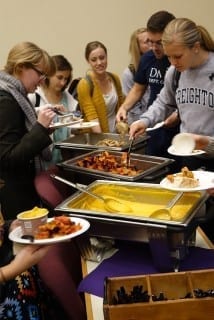
Lori Graff remembers eating food from the animals raised on her family’s farm and getting fresh milk from a neighbor. But that’s not an experience shared by her children, who’s meals are more likely to come from the Hy-Vee where she works than a local farm.
“A lot has changed in just one generation,” Graff, R.D., LD, CPCC, wellness coach at Waukee Hy-Vee, told students at Food Day on October 26. “We don’t know the story of our food or where it comes from. There is no food literacy.”
The Master of Public Health Student Club (MPHSC), Preventive Medicine Club and Global Health Student Club hosted the annual Food Day event, inviting the campus community to eat a sustainable meal while learning about sustainable food practices. Food Day is a national celebration and movement for healthy, affordable and sustainable food. This year’s theme, “Toward a Greener Diet,” encourages people to adopt healthier, earth-friendly and more humane food practices.
“The goal for our Food Day event this year was to encourage our audience to eat a nutritious, well-balanced diet, support local and sustainable farms, and to highlight the national issues that impact Americans today, such as food insecurity and barriers leading to inaccessibility,” said M.P.H. candidate and MPHSC secretary Teresa Wong.
Students lunched on free-range chicken, seasonal vegetables and butternut squash soup from Bridgewater Farm, a local and sustainable family farm, and learned about local efforts to fight food waste and food insecurity. Graff highlighted Hy-Vee’s sustainability efforts, including their partnership with Green RU, which turns inedible food waste into compost to help build fresh soil for farms, gardens and homes. So far this year, Hy-Vee has turned 3.2 million pounds of food waste into 655 tons of compost.
Composting is a great sustainability solution, but it does nothing to address the problem of getting healthy foods into the hands of those who need it most. Forty percent of our food supply is thrown out, while one in eight Iowans are food insecure. Food banks struggle to both get donations of nutritious items and get recipients to choose healthy foods off the pantry shelves, said Christine Hradek, M.P.H., Expanded Food & Nutrition Education Program/Family Nutrition Program specialist at Iowa State University Extension and Outreach.
“Education alone is not going to do it. Policy, culture and systems have to be set up to make the choices easier. That’s what it’s going to take for food behaviors. It needs to be the default choice, the easy choice. I think we’re at the beginning of that shift now.”

